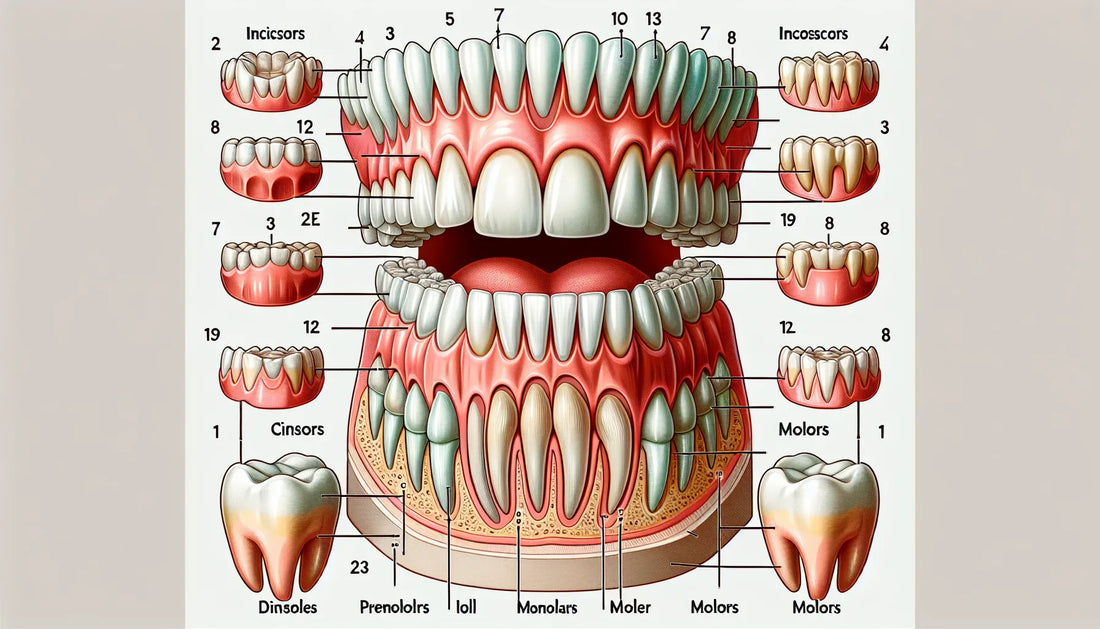The Human Dentition: A Closer Look
The human mouth is home to 32 teeth, including the four wisdom teeth that typically emerge in late adolescence or early adulthood. These teeth are categorized into four types: incisors, canines, premolars, and molars, each serving a specific function in the chewing and digestion process. Understanding the composition and purpose of our teeth is essential for maintaining good oral hygiene and overall health. In this discussion, we will explore the structure of the human dentition and the significance of proper dental care.

Baby Teeth: The First Set
Our dental journey begins with the appearance of primary teeth, commonly known as baby teeth. These teeth start to erupt around the age of six months, a process that continues until about three years of age. Children typically have 20 primary teeth—ten on the top and ten on the bottom. These teeth are essential not only for chewing but also for speech development and maintaining space in the jaw for adult teeth.
Adult Teeth: The Permanent Set
As children grow, their baby teeth begin to loosen and fall out—a process that usually starts around age six and continues into early adolescence. This makes way for the permanent teeth, which include a few additions to the lineup. Adults have 32 teeth in total, which include:
8 Incisors: The sharp, chisel-shaped front teeth used for cutting food.
4 Canines: Pointed teeth next to the incisors used for tearing food.
8 Premolars: Teeth between the canines and molars used for crushing and grinding.
12 Molars: Including four wisdom teeth, these are used for grinding food and are the last to emerge, typically in late adolescence or early adulthood.
Wisdom Teeth: The Late Bloomers
Wisdom teeth, or third molars, are the last to join the dental family, typically erupting between the ages of 17 and 25. Not everyone has all four wisdom teeth; some people have fewer or none at all. Due to evolutionary changes in our diets and jaws, wisdom teeth often become impacted or fail to erupt properly, leading to common removal procedures.
The Role of Teeth in Overall Health
Teeth are integral to more than just the digestive system. They play a vital role in speech and contribute to maintaining the structure of the face. Moreover, dental health is closely linked to overall health. Issues like gum disease can increase the risk of systemic conditions such as heart disease, diabetes, and respiratory disease.

Common Dental Issues
Dental issues can arise from various factors such as genetics, poor oral hygiene, or trauma. Some common complaints among people with dental issues include:.
Tooth decay
Overcrowding
Dry socket after a tooth extraction
Tooth decay, affecting over 90% of adults in the U.S. Over 40, occurs when bacteria erode the enamel, leading to cavities. Proper oral hygiene, including regular dental cleanings and the use of fluoride, can help prevent tooth decay. Additionally, overcrowding of teeth can cause discomfort and other issues. It's important to address dental issues promptly to prevent further complications. Various treatment options, such as dental implants, bridges, and dentures, are available to address dental problems and restore oral health.

Maintaining Dental Health
Proper oral hygiene is essential for healthy teeth and gums. It is important to brush your teeth for at least two minutes, twice a day, and to floss daily. Additionally, visiting your dentist regularly is crucial for maintaining dental health. Other common issues that can affect your teeth include tooth decay, dry socket after a tooth extraction, and the loss of minerals in your teeth as you age. It's important to take good care of your teeth and keep your gums healthy to avoid cavities and other overall health issues. Today, there are various teeth replacement options available, such as dental implants, dental bridges, and dentures. Your teeth are vital for the digestive system, as they help with biting, tearing, and grinding food before swallowing. Dentists assign numbers to any missing teeth to create an accurate tooth chart for records. Some of the most common dental treatments include addressing tooth decay and maintaining oral health. It's crucial to maintain good oral health throughout life to ensure that your teeth can serve you well for a lifetime.

Conclusion: A Smile's Foundation
Understanding the composition and importance of our teeth can empower us to take better care of them. From the 20 baby teeth that first help us learn to speak and eat, to the full set of 32 adult teeth that we rely on for the rest of our lives, each tooth has a vital role to play in our health and daily life. Regular dental care, a healthy diet, and proper oral hygiene are crucial for maintaining our teeth and enhancing our quality of life. Whether you are teaching a child the importance of brushing or contemplating the implications of wisdom teeth, appreciating the complexity and function of our teeth can lead to better health and a brighter smile.


